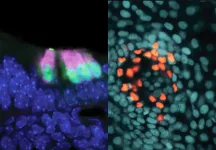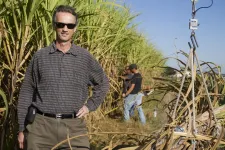Genome editing for food: how do people react?
Research team from the Universities of Göttingen and British Columbia investigates evaluations of breeding technology
2021-07-12
(Press-News.org) A research team from the University of Göttingen and the University of British Columbia (Canada) has investigated how people in five different countries react to various usages of genome editing in agriculture. The researchers looked at which uses are accepted and how the risks and benefits of the new breeding technologies are rated by people. The results show only minor differences between the countries studied - Germany, Italy, Canada, Austria and the USA. In all countries, making changes to the genome is more likely to be deemed acceptable when used in crops rather than in livestock. The study was published in Agriculture and Human Values.
Relatively new breeding technologies, such as CRISPR gene editing, have enabled a range of new opportunities for plant and animal breeding. In the EU, the technology falls under genetic engineering legislation and is therefore subject to rigorous restrictions. However, the use of gene technologies remains controversial. Between June and November 2019, the research team collected views on this topic via online surveys from around 3,700 people from five countries. Five different applications of gene editing were evaluated: three relate to disease resistance in people, plants, or animals; and two relate to achieving either better quality of produce or a larger quantity of product from cattle.
"We were able to observe that the purpose of the gene modification plays a major role in how it is rated," says first author Dr Gesa Busch from the University of Göttingen. "If the technology is used to make animals resistant to disease, approval is greater than if the technology is used to increase the output from animals." Overall, however, the respondents reacted very differently to the uses of the new breeding methods. Four different groups can be identified: strong supporters, supporters, neutrals, and opponents of the technology. The opponents (24 per cent) identify high risks and calls for a ban of the technology, regardless of possible benefits. The strong supporters (21 per cent) see few risks and many advantages. The supporters (26 per cent) see many advantages but also risks. Whereas those who were neutral (29 per cent) show no strong opinion on the subject.
INFORMATION:
This study was made possible through funding from the Free University of Bozen-Bolzano and Genome BC.
Original publication: Busch et al. (2021): Citizen views on genome editing: effects of species and purpose. In: Agriculture and Human Values (2021). https://link.springer.com/article/10.1007/s10460-021-10235-9
Contact:
Dr Gesa Busch
University of Göttingen
Department of Agricultural Economics and Rural Development
Marketing for Food and Agricultural Products
Platz der Göttinger Sieben 5, 37073 Göttingen
Tel: +49 (0)173 2509435
Email: gesa.busch@agr.uni-goettingen.de
http://www.uni-goettingen.de/de/dr.+gesa+busch/613570.html
ELSE PRESS RELEASES FROM THIS DATE:
2021-07-12
The sensory cells in the inner ear and the touch receptors in the skin actually have a lot in common, according to a new study from the USC Stem Cell laboratory of Neil Segil published in the Proceedings of the National Academy of the Sciences (PNAS).
"There are striking similarities in the development of two types of specialized sensory cells: the so-called 'hair cells' that receive sound vibrations in the inner ear, and the Merkel cells that sense light touch at the surface of the skin," said Segil, who is a Professor in the Department of Stem Cell Biology and Regenerative Medicine, and the USC Tina and Rick Caruso Department of Otolaryngology ...
2021-07-12
The Lucinidae family, lucinids for short, comprises approximately 500 living species of bivalves. They are at least 400 million years old, according to fossil records, and have managed to colonize a wide variety of habitats, from beautiful beaches to the abyssal depths untouched by the sun over a kilometer below the sea surface. Their ability to thrive in a wide variety of habitats is made possible by their 'partner in crime', a sulfur-oxidizing bacterial symbiont that utilizes hydrogen sulfide, better known as 'rotten egg gas', as an energy source to power primary production. This process is not unlike photosynthesis used by plants, yet not dependent on sunlight, ...
2021-07-12
BOSTON - By implementing a long-term, prospective approach to the development of celiac disease, a collaborative group of researchers has identified substantial microbial changes in the intestines of at-risk infants before disease onset. Using advanced genomic sequencing techniques, MassGeneral Hospital for Children (MGHfC) researchers, along with colleagues from institutions in Italy and the University of Maryland, College Park, uncovered distinct preclinical alterations in several species, pathways and metabolites in children who developed celiac disease compared to at-risk children who did not develop celiac disease.
As part of the MGHfC Celiac Disease, Genomic, Microbiome and Metabolomic (CDGEMM) Study, researchers ...
2021-07-12
Communities trying to fight sea-level rise could inadvertently make flooding worse for their neighbors, according to a new study from the END ...
2021-07-12
Better treatments of HER2-positive breast cancer are closer at hand, thanks to new research by a team led by Université de Montréal professor Jean-François Côté at the cytoskeleton organization and cell-migration research unit of the UdeM-affiliated Montreal Clinical Research Institute.
Published in PNAS, the journal of the U.S. National Academy of Sciences, the new research by Marie-Anne Goyette, a doctoral student in Côté's laboratory, reveals a highly promising therapeutic target to counter the HER2-positive breast cancer.
In HER2-positive breast cancer, a gene called HER2 is expressed that promotes an aggressive form of the disease. Affecting 20 per cent of ...
2021-07-12
ITHACA, N.Y. - Traces of the gas phosphine point to volcanic activity on Venus, according to new research from Cornell University.
Last autumn, scientists revealed that phosphine was found in trace amounts in the planet's upper atmosphere. That discovery promised the slim possibility that phosphine serves as a biological signature for the hot, toxic planet.
Now Cornell scientists say the chemical fingerprint support a different and important scientific find: a geological signature, showing evidence of explosive volcanoes on the mysterious planet.
"The phosphine is not telling us about the biology ...
2021-07-12
AUSTIN, Texas -- Lead exposure in childhood may lead to less mature and less healthy personalities in adulthood, according to a new study lead by psychology researchers at The University of Texas at Austin.
The study, published in the Proceedings of the National Academy of Sciences, sampled more than 1.5 million people in 269 U.S. counties and 37 European nations. Researchers found that those who grew up in areas with higher levels of atmospheric lead had less adaptive personalities in adulthood -- lower levels of conscientiousness and agreeableness and higher levels of neuroticism.
"Links between lead exposure and personality traits are quite impactful, because we take our personalities with us everywhere," ...
2021-07-12
Sugarcane is one of the most productive plants on Earth, providing 80 percent of the sugar and 30 percent of the bioethanol produced worldwide. Its size and efficient use of water and light give it tremendous potential for the production of renewable value-added bioproducts and biofuels.
But the highly complex sugarcane genome poses challenges for conventional breeding, requiring more than a decade of trials for the development of an improved cultivar.
Two recently published innovations by University of Florida researchers at the Department of Energy's Center for Advanced Bioenergy and Bioproducts Innovation (CABBI) demonstrated the ...
2021-07-12
Butterflies and moths have beautiful wings: the bright flare of an orange monarch, the vivid stripes of a swallowtail, the luminous green of a Luna moth. But some butterflies flutter on even more dramatic wings: parts of their wing, or sometimes the entire wing itself, are actually transparent.
Many aquatic organisms, including jellies and fish, are transparent. But transparent butterfly and moth wings are so arresting that merely catching a glimpse of one typically causes a human to lunge for a camera or at least point it out to their friends. These enigmatic, transparent butterfly wings have not been studied comprehensively.
Doris Gomez and Marianne Elias (French National Center for Scientific Research) set out to change that. Last week, along with a multidisciplinary ...
2021-07-12
Chronic alcohol abuse and hepatitis can injure the liver and lead to fibrosis, the buildup of collagen and scar tissue. As a potential approach to treating liver fibrosis, University of California San Diego School of Medicine researchers and their collaborators are looking for ways to stop liver cells from producing collagen.
"So we thought...what if we take immunotoxins and try to get them to kill collagen-producing cells in the liver," said team lead Tatiana Kisseleva, MD, PhD, associate professor of surgery at UC San Diego School of Medicine. "If these antibodies carrying toxic molecules can find and bind the cells, the cells will eat up the 'gift' and die."
In a study published July 12, 2021 in Proceedings of the National Academy of Sciences, Kisseleva ...
LAST 30 PRESS RELEASES:
[Press-News.org] Genome editing for food: how do people react?
Research team from the Universities of Göttingen and British Columbia investigates evaluations of breeding technology





